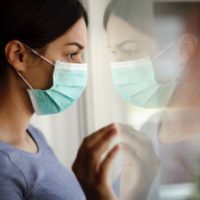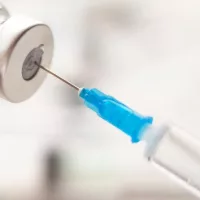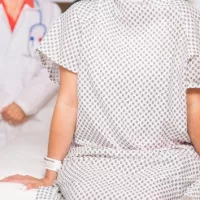
damircudic/iStockBy LAURA ROMERO, ABC News
(NEW YORK) — Experts are sounding the alarm that beyond the physical and mortal toll the coronavirus has taken on Americans, its impact on mental health can be severe as well, especially for Latinos as that population remains disproportionately affected by the virus.
A survey released by the Centers for Disease Control and Prevention (CDC) last week revealed that 41% of respondents reported symptoms of some mental disorder, including trauma-related symptoms, depression and anxiety.
According to the study, higher prevalence of symptoms of depressive disorder, suicidal thoughts and anxiety were found among Hispanic respondents. In the case of suicidal thoughts, some 18.6% of Hispanic respondents said they had “seriously considered suicide in the past 30 days.” Black respondents also reported a relatively high instance of suicidal thoughts at 15.1%, as did 7.9% of white respondents, 6% of Asian respondents and 9.8% of other races or multiple races.
The study was based on surveys conducted during the final week of June and included more than 5,000 respondents — 3,453 white, 885 Hispanic, 663 Black, 256 Asian and over 200 respondents of other races or whose race was unknown.
The CDC survey noted that symptoms of mental health conditions disproportionately affect essential workers, unpaid caregivers for adults and those receiving treatment for preexisting mental health conditions — specific work populations that are predominantly Latinos, said Frederick Sandoval, Executive Director of the National Latino Behavioral Health Association.
“What COVID has already taught us in a very quick order is why it is affecting the Latino community so much,” said Sandoval. “They’re not going to be getting the services to the extent that they could or should because of social determinants that create challenges in terms of limited access to resources, access to transportation, limited income.”
“Because of what’s happened, what we’ve seen from the pandemic, it has very easily increased the level of stress trauma, anxiety,” added Sandoval. “It’s put such emotional pressure on Latino communities across the country.”
Sandoval told ABC News that parents in communities of color who now have to balance essential worker duties and full time schooling, are likely to experience more psychological distress.
“They have a whole added burden because they’re trying to balance work, family and school and many Latino parents aren’t familiar with school apps or don’t have Wifi at home which can stress them even more,” Sandoval said.
Timothy Sullivan, M.D., chair, psychiatry and behavioral sciences at Staten Island University Hospital in New York City, told ABC News that “communities of color disproportionately deal with the effects of social crowding, poverty, lack of support and access to good care” — all of which contributes to stresses put on parents.
“Parents need to first address the material needs that their family has,” Sullivan said. “It’s no good talking to somebody about coping skills, if they can’t put food on the table or pay their rent. We need to find a way to help keep them cool, to make sure that they and their families can continue to survive.”
Sullivan said that for many, limited insurance coverage and high out-of-pocket costs have created barriers to accessing mental health care services. The CDC study recommends that community-level intervention and prevention efforts should include strengthening economic supports to reduce financial strain.
That is why organizations like the National Alliance on Mental Health Illness (NAMI) and companies like Better Help and eHome Counseling Group, which provide virtual counseling sessions, said they are trying to reduce the gap in access to mental health care services by offering lower costs and partnering with more insurance companies.
“Virtual counseling helps significantly to reduce those disparities,” said Brad Brad Rex, the President and CEO of eHome Counseling Group. “The isolation, the stress, the uncertainty caused by the pandemic is having a huge impact on people’s mental health. And our service allows people who normally wouldn’t have access to mental health care services to get the treatment they need.”
Pamela Greenberg, President and CEO of the Association for Behavioral Health and Wellness, said that companies need to make sure they are offering culturally responsive treatment in several languages.
“These communities have already started off in a worst situation in terms of their lack of health insurance, having less access to services,” Greenberg told ABC News. “We need to make sure they are getting the best and right treatment.”
For Sandoval, the CDC study is a wake up call for policy makers to prioritize mental health.
“We’re just having a tsunami effect of policies ineffective programs and lack of resources to help people who don’t ask to be fraught with illness.” said Sandoval. “Latino communities are being devastated by the pandemic and it’s heartbreaking to see. Something needs to change.”
If you or a loved one is experiencing suicidal thoughts, The National Suicide Prevention Lifeline provides 24/7, free and confidential support. Call 1-800-273-8255 for help.
For resources regarding mental health treatment NAMI HelpLine is a free, nationwide peer-support service providing information, resource referrals and support to people living with mental health conditions, their family members, and caregivers. Call 1-800-950-NAMI or text NAMI to 741741.
Copyright © 2020, ABC Audio. All rights reserved.















